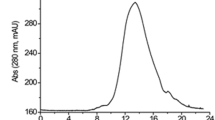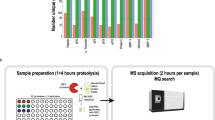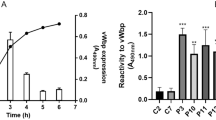Abstract
BARRATT1 found in 1932 that bacteria do not cause the decomposition of thrombin preparations, but rather that this is a chemical process I have shown that the inactivation of thrombin in native blood and in the pure thrombin solution is the same process as that which is caused by an inactivating system in plasma, but which in the preparation is present as an impurity.
This is a preview of subscription content, access via your institution
Access options
Subscribe to this journal
Receive 51 print issues and online access
$199.00 per year
only $3.90 per issue
Buy this article
- Purchase on Springer Link
- Instant access to full article PDF
Prices may be subject to local taxes which are calculated during checkout
Similar content being viewed by others
References
Barratt, J. O. W., J. Physiol, 75, 428 (1932).
Landsberg, M., Biochem. Z., 50, 245 (1913). Quick, A. I., Amer J. Physiol., 123, 712 (1938). Wöhlisch, E., and Grüning, W., Biochem. Z., 305, 183 (1940).
Moravitz, P., Bei. chem. Physiol. u. Path., 4, 381 (1904). Pekelharing, C. A., Hoppe-Seylers Z., 85, 341 (1913). Lenggenhager, K., Helv. med. Acta, 1, 527 (1935).
Lenggenhager, K., "Uber die Entstehung, Erkennung und Vermeidung der postoperativen Fernthrombose" (Verl. Georg Thime, Leipzig, 1941).
Author information
Authors and Affiliations
Rights and permissions
About this article
Cite this article
GERENDAS, M. Inactivation of Thrombin. Nature 157, 837–838 (1946). https://doi.org/10.1038/157837c0
Issue Date:
DOI: https://doi.org/10.1038/157837c0
This article is cited by
-
Revisiting the Pharmacology of Unfractionated Heparin
Clinical Pharmacokinetics (2019)
-
Histamine – Heparin – Thrombin Chain Mechanism
Nature (1948)
-
Die Wirkung des Toluidinblaus und der Thrombokinase auf den Vorgang der Thrombininaktivierung
Experientia (1948)
-
Effect of Ultra-Filtration and Carbon Dioxide on the Prothrombin Activity of Plasma
Nature (1947)
Comments
By submitting a comment you agree to abide by our Terms and Community Guidelines. If you find something abusive or that does not comply with our terms or guidelines please flag it as inappropriate.



